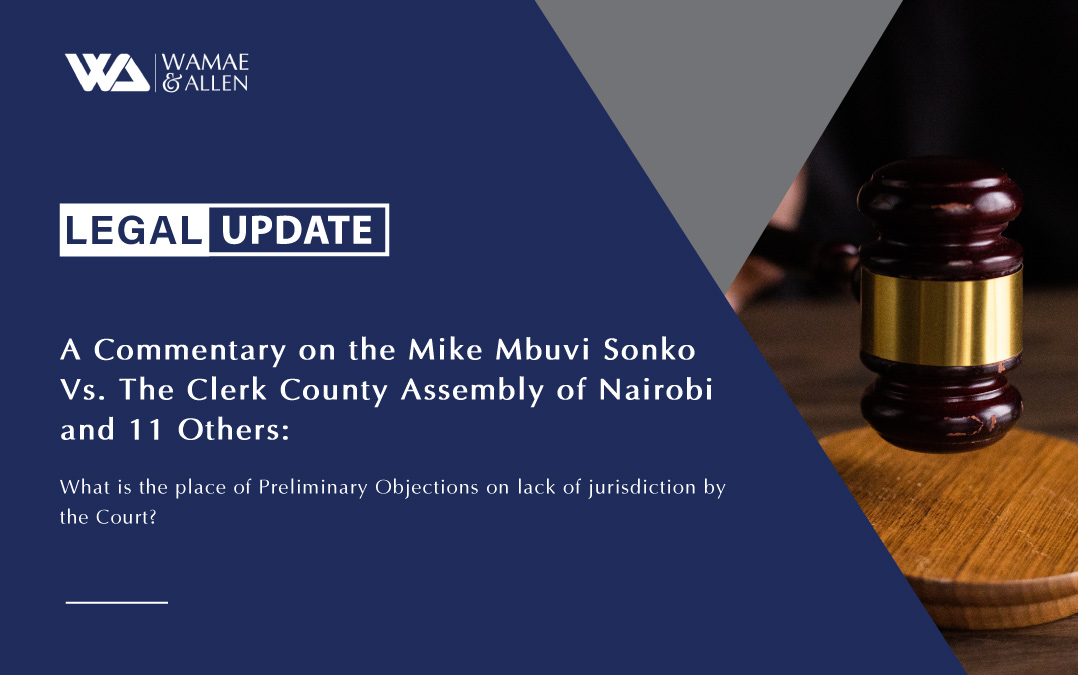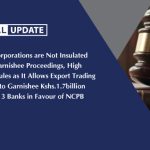What is the place of Preliminary Objections on lack of jurisdiction by the Court
By Caxstone Phelix Kigata & Frankline Michael Otieno
“The Lillian ‘S’ case establishes that jurisdiction flows from the law, and the recipient-Court is to apply the same, with any limitations embodied therein. Such a Court may not arrogate to itself jurisdiction through the craft of interpretation, or by way of endeavors to discern or interpret the intentions of Parliament, where the wording of the legislation is clear and there is no ambiguity. “The Supreme Court in the Matter of Interim Independent Electoral Commission [2011] eKLR.
INTRODUCTION
The vital, ever-germane issue in all categories of litigation, namely, jurisdiction, features in different shades in very many cases. Hardly any case entailing the issue of jurisdiction, in the superior Courts of this country, has made a step over the last quarter-century, without recourse to the common wisdom of the Court of Appeal in Owners of the Motor Vessel “Lillian S’ v. Caltex Oil (Kenya) Ltd [1989] KLR 1 in which the late Mr. Justice Nyarangi had applied memorable phraseology, thus:
“Jurisdiction is everything. Without it, a Court has no power to make one more step. Where a court has no jurisdiction, there would be no basis for a continuation of proceedings…. A Court of law downs tools in respect of the matter before it the moment it holds the opinion that it is without jurisdiction.”
In this commentary, we will discuss the Supreme Court judgment in Mike Mbuvi Sonko v The Clerk County Assembly of Nairobi and 11 Others Petition No. E008 of 2022, mainly on the jurisdiction, since the judgment was a shortened version with little or no deliberations on the other 6 grounds of appeal.
BRIEF FACTS
The Appellant (Mike Mbuvi Sonko), who until 17th December 2020 was the Governor of the Nairobi City County, was removed from office by way of an impeachment motion initiated by the Nairobi County Assembly. The decision of the County Assembly was confirmed by the Senate pursuant to Article 181 of the Constitution, Section 33 of the County Governments Act, Standing Order No. 67 of the Assembly, and Standing Order No 75 of the Senate. Attempts by the Appellant and the 12th Respondent to overturn the decision through a challenge both in the High Court and the Court of Appeal were unsuccessful, precipitating the instant appeal.
THE DECISION
The Supreme Court in framing 7 issues for determination, declined to determine other issues raised by the Appellant, on the ground that those issues were primarily factual and evidentiary issues, over which the Supreme Court has no jurisdiction, in line with the finding of the court in Housing Finance Company of Kenya Limited & another v Sharok Kher Mohamed Ali Hirji & another [2021] eKLR, where the Supreme Court held that it cannot resolve primarily factual or evidentiary disputes.
Secondly, the court considered the standard of review of a court in proceedings challenging an impeachment. The court was emphatic that impeachment is a legislative or political affair and therefore the province of the legislature. The Court then characterized the court’s role in a case challenging an impeachment, as limited to the process and does not entail an evaluation of the merits. The rationale given by the Supreme Court is premised on the doctrine of separation of powers and the need for courts to allow other constitutional bodies to exercise their mandate.
Therefore, all the courts are concerned with in a case challenging an impeachment is whether the standing orders were followed, for example, the threshold, quorum, and such complaints. The courts also review whether the Governor’s constitutional rights and fundamental freedoms have been breached in the process. Here the Supreme Court makes an important finding that impeachment is concerned with personal responsibility as opposed to criminal responsibility.
The foregoing means that for purposes of Chapter 6 of the Constitution, it is immaterial that a person has not been convicted of a criminal offense. Here, the Supreme court seems to agree with the High Court in Trusted Society of Human Rights Alliance v Attorney General & 2 others [2012] eKLR, where it was held that for purposes of chapter 6, what is relevant is whether there are serious and unresolved questions about a person’s integrity and suitability to hold office.
Thirdly is the main issue of jurisdiction. The 3rd Respondent in the case raised a preliminary objection on grounds that the appellant failed to specify the provisions under which he invoked the Court’s jurisdiction, a principle set out in the case of Hermanus Phillipus Steyn v. Giovanni Gnecchi-Ruscone [2013] eKLR. The court while allowing the preliminary objection, held that the appellant had failed to specify under which limb of Article 163(4), the appeal was brought and therefore, the appeal was incompetently before the court.
A COMMENTARY
Instead of downing its tools at that point, the court then proceeded to determine the other six issues for determination (the merits of the appeal). The Court justified its unprecedented move by invoking “public interest” and the need for the nature of the dispute, the broad interests of both the parties and the need for due guidance to the judicial process and to the courts below. While this commentary admits that the intention of the Supreme Court may have been noble, there are fundamental conceptual flaws in the Supreme Courts’ argument, which shall become apparent below.
The starting point is that the supreme court based its decision to proceed and shed light on the merits, of the Lemanken Aramat v Harun Meitamei Lempaka & 2 others [2014] eKLR. The ratio decidendi of the Lemanken Armat case is that the Supreme Court has a “special jurisdictional competence” and it can consider the issues of merit even after holding that it has no jurisdiction in a matter, since the principle in Lillian S case does not apply to it.
The first criticism is that this approach is an attempt to expand jurisdiction through judicial craft and legal sophistry. In a litany of Supreme Court cases such as Samuel Kamau Macharia & another v Kenya Commercial Bank Limited & 2 others [2012] eKLR and In the Matter of Interim Independent Electoral Commission [2011] eKLR, the court has held that it can only do justice where it has jurisdiction. More profoundly, in the case of Jasbir Singh Rai & 3 others v Tarlochan Singh Rai Estate of & 4 others [2013] eKLR, where it was held that the question is not whether the Supreme Court can redress all injustices brought to its attention but whether the Supreme Court has jurisdiction to redress all injustices brought to its attention. This means that despite the substantial public interest involved, the Court can only intervene where it has jurisdiction.
The second criticism is that the holding of the Supreme Court is likely to cause chaos in the other courts below it in the judicial hierarchy. In Evans Odhiambo Kidero & 4 others v Ferdinand Ndungu Waititu & 4 others [2014] eKLR, Njoki Ndungu, SCJ, in her concurring opinion, remarked that the principle of stare decisis in Kenya unlike other jurisdictions is a constitutional requirement aimed at enhancing certainty and predictability in the legal system. By virtue of Article 163 of the Constitution, all courts below are bound by the decisions of the Supreme Court. If the Courts below follow the Mike Sinko precedent, then preliminary objections are likely to be less effective since courts may proceed and determine the issues raised, even after allowing a preliminary objection, under the guise of “public interest” (a very broad and vague principle/unruly horse).
Lastly, this commentary views the Supreme Court’s concerted effort to expand its jurisdiction well beyond the constitutional and statutory limit as a subversion of the constitution camouflaged in over-embellished words such as “the need to provide guidance to the judicial process for the sake of posterity and development of jurisprudence.” While these words sound attractive and ingenious, they lack legal backing. Courts do not enjoy absolute power. Instead, they exercise a limited authority delegated to them in the Constitution and their founding statutes. This power (jurisdiction) defines the authority of a court to hear and determine cases.
Generally, jurisdiction is defined by law which sets the limits of the exercise of judicial powers. This emanates from the culture of accountability where courts are answerable and faithful to the law. The law gives and limits the authority of courts whose confines should be stated in the most precise and clearest of words to avoid confusion. Without the authority of the law, a court cannot exercise powers to hear and determine a matter. If it does, the court does not only act illegally but also illegitimately.
Indeed, the Supreme Court had no legal basis to expand its jurisdiction on the premise of “providing clarity” when it has specific jurisdiction to give an advisory opinion. Such jurisdiction was not invoked in the case it purported to provide clarity as the matter before it was not an advisory opinion, but an appeal from the decision of the Court of Appeal. The Supreme Court had no jurisdiction to turn an appeal into an Advisory Opinion. If this is not checked, then, it can lead to judicial anarchy on unprecedented proportion.
CONCLUSION
In a shocking turn of events, the Supreme Court went off the jurisdictional tangent in the Mike Mbuvi Sonko Case. Though this raises the question of judiciousness, the more compelling issue is that of legitimacy. One hopes that this holding will not be abused by courts below to exercise illegal and illegitimate jurisdiction in matters where they lack jurisdiction.
However, despite the shortcomings of the judgment, it was refreshing to see the court enforce chapter 6 of the Constitution and its intended aim of political hygiene.
This article is provided free of charge for information purposes only; it does not constitute legal advice and should be relied on as such. No responsibility for the accuracy and/or correctness of the information and commentary as set in the article should be held without seeking specific legal advice on the subject matter. If you have any queries regarding the same, please do not hesitate to contact Litigation vide litigation@wamaeallen.com
Read more Legal Updates
